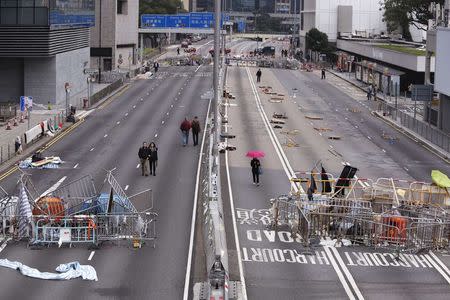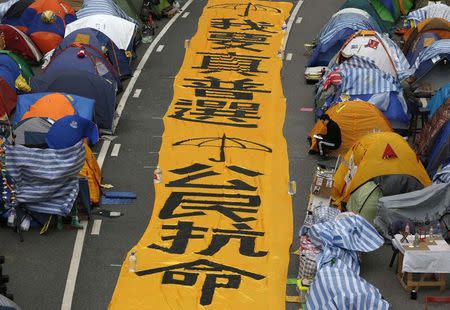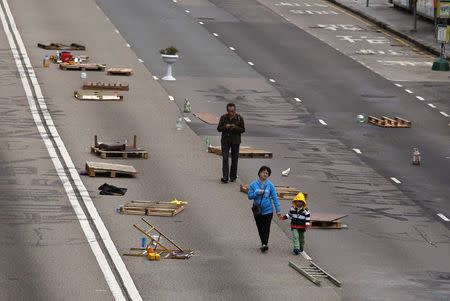Hong Kong splinter groups fast-track rearguard action ahead of camp clearance
By Donny Kwok and Lizzie Ko HONG KONG (Reuters) - Splinter protest groups calling for democracy for Hong Kong are springing up and fast-tracking action plans as student-led demonstrators consider a retreat from the main campsite which has blocked key downtown arteries for more than two months. Protesters were thin on the ground on Monday ahead of an expected mid-week clearance of the main camp site at Admiralty, home to government offices and next to the main Central business district. The "Umbrella Movement" protests have been largely peaceful in their demand for a free vote in the Chinese-controlled city. But Chief Executive C.Y. Leung, who has branded the protests illegal, over the weekend rejected calls for more talks on political reform and warned protesters not to turn to violence when the clearance starts. "The government doesn’t respond to peaceful demonstrations, so naturally there will be more and more radical groups setting up," said Wong Yeng-tat, founder of Civic Passion which tried to break into the Legislative Council building last month. "What the government is doing now is pushing people to being more radical." Clashes between protesters and police increased after the clearance of protest sites in the densely populated working-class district of Mong Kok district, on the Kowloon side of Hong Kong harbor. One man was jailed for six months on Monday for threatening to burn Mong Kok demonstrators with paint thinner, media said. Since the Mong Kok violence, Civic Passion has started a trend dubbed "shopping revolution", in which between 50 and 200 protesters gather in Mong Kok stores which are hugely popular with mainland Chinese. Joe Ling, 26, said he would continue to "shop" to send a message to mainland tourists. "If we continue this, they can see it, and they’ll take these memories back to the mainland, and I think this is necessary," Ling said. Hong Kong, a former British colony, returned to China in 1997. Under a "one country, two systems" formula, the city has some autonomy from the Communist Party-ruled mainland and a promise of eventual universal suffrage. Beijing has allowed a vote in the next election in 2017, but insists on screening any candidates first. Another splinter protest group called the Student Front was founded on Saturday, urging protesters to use shields to defend against any clearance, rather than wait to be arrested. It said the protest movement could no longer be restricted to the idea of non-violence. Sporadic movements and fragmented groups are also appearing online through anonymous forums. A message posted on Facebook last week urged people to "party" at the protest sites over the Christmas holidays, bringing sticks and bricks, media said. But Joshua Wong, one of the key student leaders since the beginning, said his group would maintain the principle of non-violence during the clearance of the Admiralty site. "Clearance is a matter of time," said Chan, 69, who helped build and maintain the students' study area at the site. "We will continue until the last moment and then we will walk away." (Additional reporting by Clare Jim and Joseph Campbell; Writing by Farah Master; Editing by Nick Macfie)






